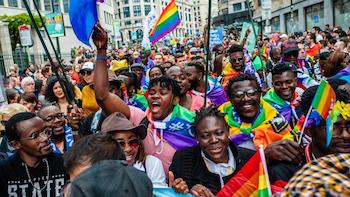Can We Find Faith When Society Lets Us Down?
What happens when the systems we trust no longer serve us? How do we find hope when society refuses to accept us for who we are? For many marginalized individuals, the world feels more like a battleground than a place of belonging. But in these moments, where can we turn for strength and resilience?
People often find faith in the most unexpected places when society fails to provide validation or support. Can faith be found in human connection, within ourselves, or even in the face of challenges and hardships? This article explores how individuals tackle the absence of societal support and discover hope in the least expected corners of life.
The Reality of Marginalization
How Society Creates Invisible Barriers
From discrimination to exclusion, society fails to provide the space and acceptance that people—especially those from marginalized communities—need to succeed. Whether it’s systemic racism, homophobia, or rigid religious principles, these barriers prevent individuals from expressing their true selves without fear of judgment.
These experiences of isolation are powerfully depicted in Arthur L. Jenkins’ The Blue Street Stories, where characters face rejection, prejudice, and a lack of understanding. Yet, rather than surrendering themselves to hopelessness, they learn to find strength and faith in unlikely places. But what happens when society doesn’t offer the guidance and protection we expect? Where do we go from there?
The Search for Faith
Is Faith Only Found in Religion?
Faith is often associated with religious beliefs, but what if it’s something much broader? For those living on the margins, traditional structures of faith, like religious institutions, may feel inaccessible or even hostile. This leads to a critical question: Can faith be found outside religious frameworks? The answer is yes. Faith can manifest in the belief in oneself, the power of human connections, or the resilience found in adversity.
Finding Faith in Unlikely Places
Human Connection – A Source of Resilience
Individuals often turn to their communities for validation and strength when society fails to provide support. This is especially true for those whose identities challenge societal norms. Close relationships—whether with friends, chosen family, or romantic partners—can offer the emotional support and understanding that society withholds.
In many ways, the characters in The Blue Street Stories find their faith in one another. Rather than looking to society for approval, they create networks of care, mutual understanding, and resilience. This sense of community becomes a foundation for self-acceptance and healing.
Inner Faith – Trusting Yourself When the World Doesn’t
When the world feels against you, learning to trust yourself is one of the most significant acts of faith. Marginalized individuals often discover a powerful inner strength by accepting their identity despite the opposition they face. They realize they don’t need external validation to live authentically. This journey of self-trust and empowerment shows that sometimes, the most unlikely place to find faith is within ourselves.
The Power of Defying Society’s Expectations
Faith as a Rebellion against Norms
A rebellious kind of faith arises when people reject the judgment and limitations imposed on them by society. When traditional structures fail, individuals can redefine their faith—faith in who they are, the communities they build, and the futures they choose. By defying societal norms, they create a new kind of faith that doesn’t rely on acceptance from a world that doesn’t understand them.
Rediscovering Faith in Humanity
While society as a whole may disappoint, there are always moments of human kindness, compassion, and empathy that shine through. Sometimes, these aspects of humanity come from the most unlikely places—a stranger offering a word of kindness, an unexpected ally standing up against injustice, or an unlikely friendship that crosses social boundaries.
Finding faith in humanity, despite the failures of societal systems, reminds us that while the world may seem harsh, the goodness of individuals can offer hope and a sense of belonging when we least expect it.
Faith Beyond Society’s Limits
It can be easy to feel hopeless when society fails us, but The Blue Street Stories teaches us that faith is not limited to traditional beliefs or external validation. Faith can be found in the connections we build, the strength we draw from within, and in the small acts of kindness that remind us of our shared humanity. Finding faith in unlikely places becomes a powerful tool for reclaiming identity, living authentically, and rejecting the narratives that seek to confine us.
Conclusion
Society may fall short, but that doesn’t mean we must lose faith entirely. We can find strength in the most unlikely places by turning inward, forming meaningful connections, and recognizing the goodness that still exists in others. These acts of faith, however small, allow us to rebuild our sense of self and purpose, even in the face of a world that fails to see our worth. So, ask yourself: Where will you find your faith when society lets you down? The answer may be closer than you think.
Call to Action
Are you ready to discover the powerful stories of resilience and hope in The Blue Street Stories? Take a look into Arthur L. Jenkins‘ interesting collection today and witness how faith can emerge even in the darkest of places. Grab your copy now!
